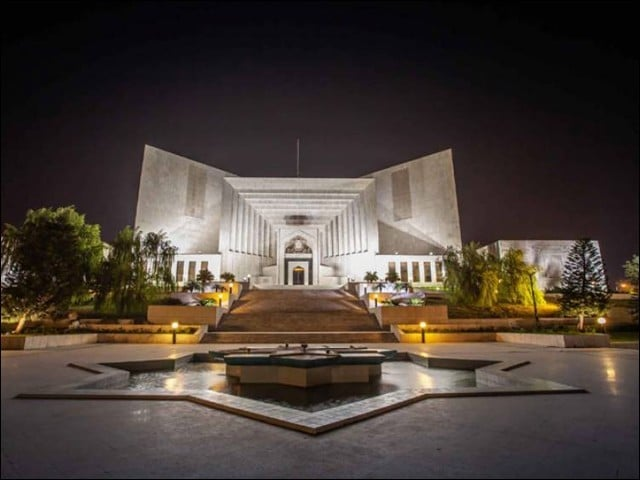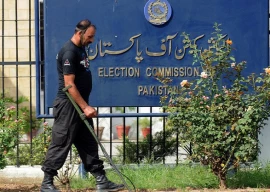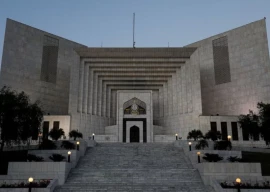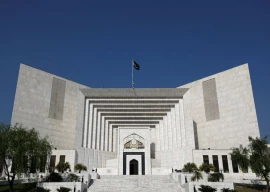
The Supreme Court has ruled that any person who wants to be part of a disciplined force should be a person of utmost integrity and uprightness with an unimpeachable, spotless character, and clean antecedents.
The court has also highlighted the importance of proper and impartial investigation in criminal cases, while noting that the police force is a disciplined force with significant accountability and the responsibility of maintaining law and public order in the society.
"No doubt, an Investigating Officer (IO) plays a crucial role in the administration of the criminal justice system and the constituent of investigation report and its worth keeps hold of plenteous value and repercussions on the outcome of any criminal case.
"However, at times, a botched-up investigation can become a top impediment and stumbling block in the administration of justice,” said an eight-page judgement authored by Justice Muhammad Ali Mazhar.
Justice Mazhar was leading a three-member bench that heard the appeal of a police official who was removed from service by the Sindh Service Tribunal on account of a defective investigation in a minor’s rape case. The bench upheld the tribunal’s verdict.
The SC’s order said a botched-up investigation can either be intentional with the aim to favour an accused or unintentional due to inefficiency, incompetence, or unskillfulness of the IO.
"The criminal justice system signifies the procedure for adjudicating criminal cases in order to award a sentence to the culprits for the offence committed by them. The foremost objective is to penalize the offenders subject to the proof whether the offense has been committed or not.
“This very important aspect is attached with the burden of proof on the prosecution which has direct nexus with the investigation report and the material and evidence collected by the IO in discharge of his sacred duty to bring out the truth without engaging in any manipulation, favoritism, or exceeding the bounds of the law.”
The SC noted that a defective investigation gradually contaminates the judicial process and poses a hazard to human rights. In unison, it is the duty of superior officers and officers in charge of police stations to ensure that an IO follows the provisions of law conscientiously.
"The task of investigation is an art and for attaining the proficiency in the job of investigation, extensive on-job training is also required to ensure integrity and uprightness, without any temptation for personal gains or advantages.
“It is also a foundational pathway for the prosecution case, and being a sacrosanct duty of an IO, it should be performed without any recklessness, sluggishness, or greediness," it said.
Read Justice Naeem takes oath as SC judge
Citing Section 4 (l) of the Code of Criminal Procedure (CrPC), the court stated that the term “investigation” includes all the proceedings under the CrPC for the collection of evidence conducted by a police officer or by any person.
It said this duty or task was also given much significance under Rule 25.2 of the Police Rules, 1934 which deals with the power of IOs. Under Sub-rule 3, the SC said, it is provided that it is the duty of an IO to find out the truth of the matter under investigation.
"His object shall be to discover the actual facts of the case and to arrest the real offender or offenders. He shall not commit himself prematurely to any view of the facts for or against any
person,” it said.
The court also mentioned Section 166 (2) of the Pakistan Penal Code (PPC), which says that if an IO fails to carry out the investigation properly or diligently or fails to pursue the case in any court of law properly and in breach of his duties shall be punished with imprisonment of either description for a term which may extend to three years or with fine or with both.
"Section 27 of the Anti-Terrorism Act, 1997, provides that if an Anti-Terrorism Court or a High Court comes to conclusion during the course of or at the conclusion of the trial that the IO, or other concerned officers have failed to carry out investigation properly or diligently or have failed to pursue the case properly and in breach of their duties, it shall be lawful for such Court or, as the case may be, the High Court, to punish the delinquent officers with imprisonment which may extend to two years, or with fine or with both by resort to summary proceedings.”
It said a similar provision has been incorporated under Section 22 of the Anti-Rape (Investigation and Trial) Act, 2021.
“[It] explicates that whoever [is] entrusted to investigate scheduled offences, fails to carry out the investigation properly or diligently or causes the conduct of false investigation or fails to pursue the case in any court properly and in breach of duties, shall be guilty of an offence punishable with imprisonment which may extend to three years and with fine.”

1730959638-0/trump-(19)1730959638-0-405x300.webp)
1719925273-0/BeFunky-collage-(46)1719925273-0-165x106.webp)







1730957050-0/Copy-of-Untitled-(17)1730957050-0-270x192.webp)

1710219222-0/naeem-(1)1710219222-0-270x192.webp)









COMMENTS
Comments are moderated and generally will be posted if they are on-topic and not abusive.
For more information, please see our Comments FAQ